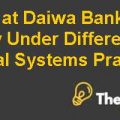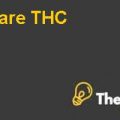
Value addition:
It is expected by the management of ML that this deal brings a $100 million of synergies with it in terms of marketing and sales cost efficiencies for ML’s similar product. However, it should be noted that there are alternatives available to ML to achieve marketing and sales targets for their products because they could outsource their marketing and sales as well as add additional sales staff for this purpose etc. Nevertheless, this does not seem to be appropriate that a company facing investigations and product acquisition issues with decreased sales in its most key drugs would be a better option for merger solely because of these sales target and expected synergies that would be achieved the other way. Simultaneously, de-valuation of its value to almost half in two years’ of time span with reduction of sales in KL’s key drugs suggest that this firm is under great pressure and therefore ML should not go for this deal solely to get marketing or sales support.
Shareholders’ vote:
It is evident from the voice of the large and most vocal shareholders of ML, Ichan and UBS Asset Management, that investors of ML are not in favor of this deal. Stock prices also suggest this fact which turned negative for both companies (as discussed in the next section). PC (an investment advisor) knew that voting of investors would not be in favor of this deal, so it tried to build its voting power in ML so as to vote for this deal without disclosing the fact of beneficial ownership more than 5% as required by SEC. It has already purchased KP’s shares and intention is to profit from this ML-KP merger. Hence, it is clear that investors are of the point that this deal does not seem to be attractive and majority of them are expected to vote against this merger except for the profit taking investor PC.
Market prices:
Market prices of both the companies could be observed in the following graph.
It could be observed that the deal was viewed to be negative for the firms as share prices on the date of announcement turned low as compared to that at the start of year. Simultaneously, it should be noted that bid of $16 per share seems to be too expensive for a struggling company like KP which is trading at $10 per share giving 60% premium on the deal over market capitalization. This suggests that the likelihood of this deal is that ML’s investors would be voting against this deal so it should not be carried forward at this rate (i.e. it should be revised) or the deal should be rejected by ML.
Perry Capital’s action and the ethical issue:
An investment advisor, Perry capital (PC) moved forward to acquire shares of ML so as to set-off the voting that it expected to be against this deal. PC is looking forward to profit from the spread of this deal as it already have stakes in KP and the spread (difference between the equity value of KP and the value offered by ML for KP) would allow them to earn profit from this merger solely by this deal spread. PC already know on the back end that its stakes in ML would be risky because of this deal so they simultaneously moved forward to hedge this risk through a swap deal for ML’s shares and hence possess no economic interest or risk in ML while they can enjoy their profit taking from the spread of this deal if the merger goes on.
The voting interest building by PC was solely for the reason of empty voting without holding any open risk (as they swapped its ML stakes) and PC did not disclosed its beneficial stakes which is required by exchange act section 13(d) to disclose the beneficial interest within ten days but PC did not disclose this considering they could defer the disclosure as per rule 13d-1 (b) as an acquisition of shares in “ordinary course of business”. However, SEC should take stand that this is not an ordinary course of business; rather the purpose was to set-off the voting over this deal while acquiring no economic interest and hence de-railing the shareholder’s vote which was majorly against the deal solely for profit taking. SEC should penalize PC for this non-disclosure.....................................
This is just a sample partial case solution. Please place the order on the website to order your own originally done case solution.














